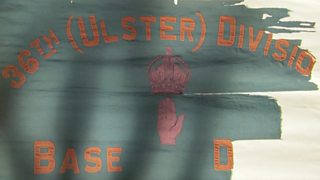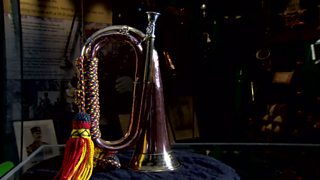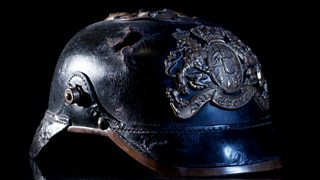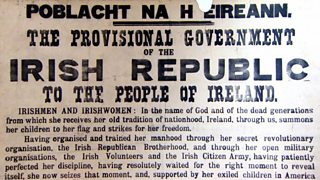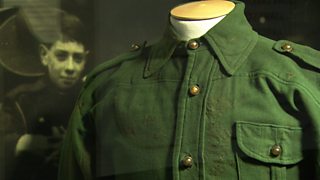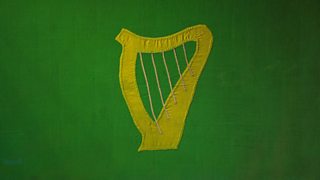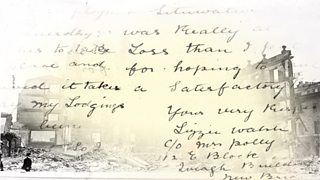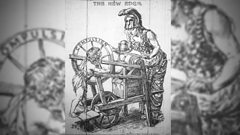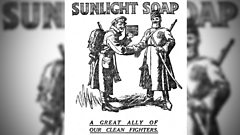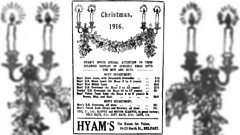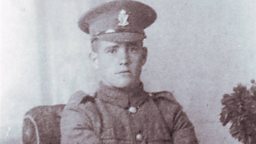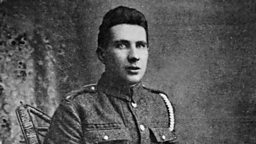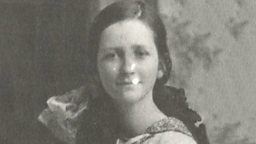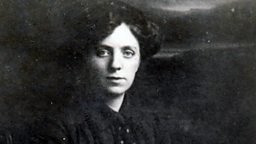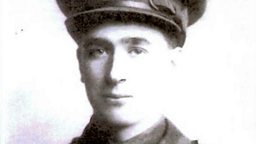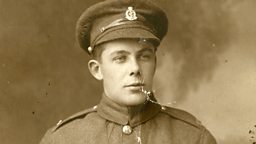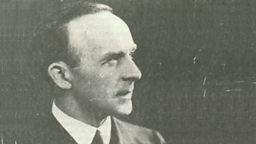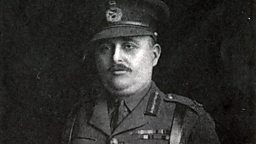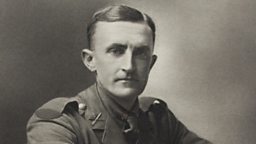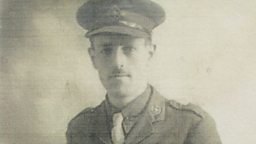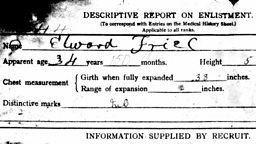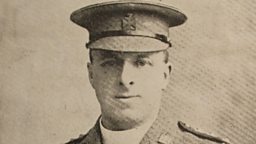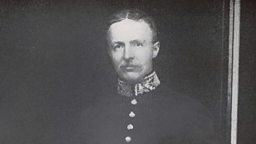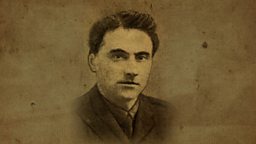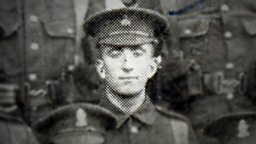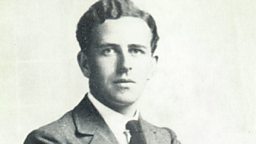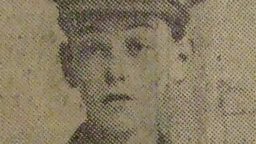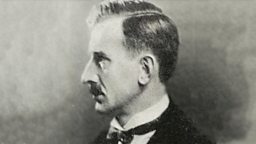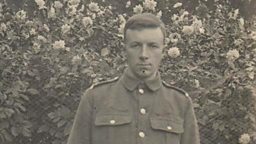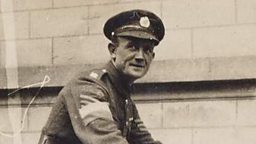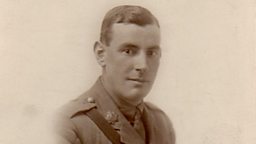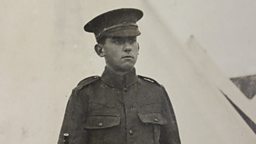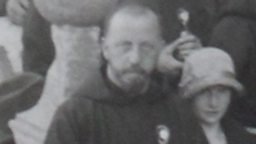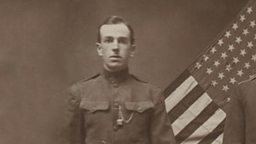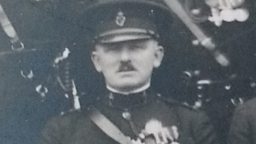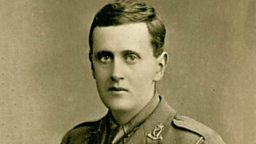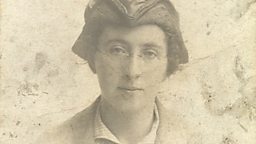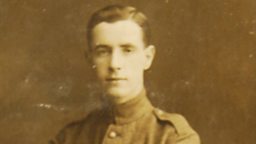Charles Weld
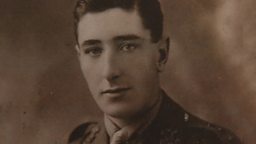
Young officer at the Somme
Charles Weld was born in County Kildare. Enlisting in the British Army at c. 19 years old, he landed in France in July 1915 as part of the 2nd King Edward's Horse.
Men dead from recent gas attack lying about in every trench. Can’t bury them fast enough
Subsequently commissioned temporary 2nd Lieutenant with the 7th Battalion, The Prince of Wales's Leinster Regiment (Royal Canadians) in March 1916, Weld recalled of this time: "Feel very strange I know nobody. I am wondering how I shall fare as an officer with its attendant responsibilities."
Across his service during World War One, Weld would chart his progress, keeping small diaries of his experiences, very often daily. These begin in September 1915, the very earliest diaries not having survived.
Kept contemporaneously, Weld's diary entries are often practical and factual: "Early this morning the enemy exploded two mines ... Severe fighting with bombs & grenades followed."
Weld's papers also include a version, written memoir-style, of his earlier day-to-day experiences earlier in the war, with entries in which he reflects more broadly: "One wonders how many of us will march back again with the Bn ..."
Throughout, his writing in this memoir tells of a deep attachment to family and home. After getting his officers' uniform, on kit leave in London in March 1916, Weld recalls: "Mother arrived in London. Can't say how glad I was to see her." Their subsequent parting he records as difficult: "... feeling very home sick & downhearted after parting from Mother. Although one rarely thinks of such a thing one can't help thinking when parting from relations & returning to France that it may possibly be the last time to see them."
As noted, Weld then returned to France, according to his memoir, as a very young officer apprehensive about he might manage. He would go on to serve to the end of the war, and be promoted, mentioned in dispatches, and awarded the Military Cross. On completion of service in 1919, Charles Michael Weld retained the rank of Captain.
World War One
France disembarkation
Enlisting with 2nd King Edward's Horse, Charles Weld arrived to France, according to his records, on 15 July 1915.
Of this, in his memoir, he notes by introduction: "Landed in France as a trooper owing to Canadian casualties we were sent out before our training was half finished needless to say we were lacking in most of the arts required in war but made up by keenness."
Trench life
Weld's very first impressions have not survived, as the first portion of his diaries is lost. In September, however, when his extant diaries begin, his memoir states that he was "at the opening battle of Loos in Sept 1915."
By then, Weld was in the throes of trench life. His earliest contemporaneous diary entries describe the weather ("last few days very wet leaving trenches in terrible state of mud"), intensive fighting ("all day we were shelled very heavy about noon. Rowen struck with shell"), casualties ("... Rowen died at 11 o'clock at Aldershot camp. Buried on road ..."), and his own physical state ("very tired & feet very sore").
In his memoir, he writes that this death, of his friend Rowen, "worried me a great deal. My first experience of loosing [sic] a real pal." Still just weeks into his active service, he describes thinking: "One gets very tired of this but I suppose it is war ..."
Back from the front line, Weld's diary records: "Sunday 17th [October]. Went to Church Parade in morning. Day fine but cold went picking blackberries in afternoon. Artillery fire proceeding around Ypres." In his memoir, he mused on this: "How strange it seems having church in an old barn, & yet how earnest & genuine everybody's prayers are. Couldn't help thinking during the sermon of the folks at home & wondering what they were doing."
Then in late October came word in his diary of a promotion: "... Paraded early to go before Colonel to get recommended for commission. Later went before General Seely who recommended me & shaking hands wished me luck ..."
By November 1915, Weld's diary describes having to "... dig trench to drain front line. Terrible wet & digging heavy ...". Of his thoughts at this time, he recalled in his memoir: "Everyone longs for this damned trench warfare to be given up & start open warfare."
Christmas 1915
In mid-December 1915, Weld contemporaneously wrote of a "feared gas attack along this front. All preparations made in case of attack."
His diary entries show this followed a period in which the weather had been so cold, he wrote, they had in late November "to light fire to thaw our boots to get them on." In the run-up to Christmas, he describes how a "... machine gun turned on us again ... Had to jump into ditch for safety", and a day spent "catching rats around camp."
But then came Christmas Eve, when Weld went, his diary says, "in evening to help to get Xmas dinner consisting of goose peas cabbage & beef."
Christmas Day itself brought some respite, the diary records: "Stayed in bed till late. Had Xmas dinner & pudding. Sir Henry bought us wine. Had a jolly morning. French bombarding nearly all day. Hardly a shot fired on our front."
In his memoir, Weld noted this as a day of both hope and homesickness: "One's thoughts cannot help wandering to those at home & wishing that we were there instead of under the enemies [sic] guns. Yet someone must be there. We can only hope that we will be at home next Xmas beside those we love."
Officer of the Leinster Regiment
In February 1916, Weld's diary entries show he attended a cadet course.
On 19 March 1916, he was officially commissioned to the Prince of Wales’s Leinster Regiment (Royal Canadians), as a Temporary 2nd Lieutenant, from King Edward's Horse. He was to join the 7th (Service) Battalion, part of 16th (Irish) Division.
On 20 March, he noted in his memoir that he was "getting officers uniform"; then, getting "4 days kit leave" with his "commission having been granted", Weld was delighted to briefly meet his mother in London.
After their parting, he wrote of his thoughts in his memoir: "In this game where hundreds of lives are laid down weekly one cannot tell the moment when one’s turn may come. How thankful I often feel that I am not married & have no dependents."
Weld then went to find his new regiment, noting in his chronicle/memoir: "Went at night to trenchs [sic] to join my new regiment which was at Loos." He recalls feeling that he knew nobody, and was worried about how he would fare.
Now an officer, however, immediately on arrival his diary records that Weld was plunged straight into duty: "Had charge of ammunition party last night ..."
Hulluch gas attack
In mid-April, Weld's diary records "... heavy shelling in evening around Loos & Hulluch."
Then, at the end of the month, on 27 April 1916, in the early hours, the War Diary of the 7th Leinster Regiment states: "The enemy made a gas attack on PUITS 14 BIS and HULLUCH."
Weld wrote contemporaneously in his diary: "... gas attack on trenches between Hulluch & Loos. Enemy attacked & got into our front line & support but were bombed out again in half an hour. Strange to say they left neither dead or wounded behind carrying all back to their trenchs [sic] when we bombed them back."
Then, on 29 April, at 4.30 pm, the 7th Leinsters War Diary records: "Sudden orders to relieve the 8th Bn INNISKILLINGS in Right of HULLUCH as they had suffered by another Gas Attack in the morning ..." It continued: "The men ... were magnificent and cool", noting that the "trenches not thoroughly clear of Gas. The trenches were in an appalling state from the attack in the morning as the relieved unit had not had time to carry away their casualties."
Of this experience Weld wrote in his contemporaneous diary: "... men dead from recent gas attack lying about in every trench Can't bury them fast enough Mostly the Innis [Royal Inniskilling Fusiliers] & Dubs [Royal Dublin Fusiliers] who caught it from gas. Bodies from heat beginning to smell. German dead also heaped about ... Terrible sight. About 12 o clok [sic] last night enemy attacked on right of us but were bombed back after about half hour. Stood to for nearly 2 hours from 3 AM expecting fresh gas attack. Everywhere smells strongly of gas remains of last gas attack 3 days ago ..."
In his memoir, Weld described how he saw "hundreds of men who were gassed ... filed three deep."
"These unfortunate men all died in the greatest agony", he continued, recalling that their faces "... have all turned purple as a result of the gas. This is about the most fearful sight I have yet seen."
A day later, Weld wrote in the memoir, that the weather was: "... very hot & as a result the dead which have not been buried are beginning to smell frightful. I thought I was accustomed to war & all its frightfulness, but this fairly staggers me."
In the days that followed, he recorded in his contemporary diary several false gas alarms.
Easter Rising
At the same time as the Hulluch gas attack was happening, the Easter Rising had been taking place in Dublin, with the Irish rebels eventually surrendering in Dublin from 29 April 1916.
Shortly afterwards, early in May, Weld wrote in his diary that the Germans had placed a notice up, in the early morning, "about 80 yds away reading 'Irishmen heavy uproar in Ireland. English guns firing on your wives & children'. Placed it on edge of crater. We shelled them this morning with rifle grenades while they replied ..."
Raid at Loos
Towards the end of June 1916 Weld described a raid in which he was heavily involved.
He records in his chronicle/memoir that prior to the attack, he felt "somewhat elated" as he had "been given command of the right raiding party ..." But, he adds, "in view of the coming attacks my thoughts are constantly at home with those I love." From reports received, he wrote, he considered that their task was "both difficult & dangerous & one cannot help wondering which of us shall pay with our lives."
In his contemporaneous diary, Weld wrote of his experience: "... moved up to front line about 10.30 PM armed with bombs. At 12-15 Harrison's mines went up a beautiful sight seeing huge sheet of flame leaping into sky, the crater being about 50 yds by 30 yds & 20 yds deep. We moved to up to front line ... got over the parapet into No Man's Land. When gone about 20 yds German artillery opened up on us something terrible. Shells bursting all around."
He recorded his own immediate response in his diary: "Strange to say all traces of fear left me. A disregard for danger came over me. Then the machine guns opened up on us, 3 of them, one in front & 2 on side. I was leading & got within 6 yds of German trench when I though better to stop up party & lye [sic] down. The machine guns never stopped playing on us. How any one escaped I can't say. It was wonderful."
Weld was, his diary says, wounded twice in the raid, "but only very slight. Both pained very much."
His return was difficult: "As I was in front those behind managed to crawl away ... Another man & myself dare not move we were seen & every time we made a move the machine gun was turned on us. Having laid there for nearly 3 hours I decided to risk it as my wounds were bleeding & I was getting numb. I made a rush for crater but was seen & had to take cover from bullets, but thank God after short rushes & some marvellous escapes I got back to our lines. My hands were torn & bleeding from barbed wire when crawling."
The attack, Weld wrote in his diary, was successful, though casualties were incurred: he himself "came back [entirely] worn out but thankful to escape with so few wounds."
In his memoir, Weld noted that he thought "our daily papers will merely state that we carried out a raid on the enemies [sic] line. I often wonder if the people at home have the slightest idea what a bloody hell the men have to go through ..." But, he concluded: "... yet the game has to be played to the last."
Burning desire to kill
In his next entry, after the June 1916 raid, Weld reflected more widely in his memoir on what he had experienced: "... all during last night's attack, my thoughts never wandered from the task in hand. I suppose it is the same with every man in battle, for personally it never struck me what a risk we were running or how close death was to us all."
He continues: "In the heat of the fight a mad lust takes possession of one, a burning desire to kill being uppermost in every man's brain ... I should say it is this sinking to the level of the brute beast that carries one through such frightful carnage. When looking back on the past events one wonders that civilised man should sink to such depths."
The Somme
To the front line
In August 1916, Weld reflected in his memoir that the men were "wondering when our turn to go to the Somme will come as we are pretty sure of being sent."
Towards the end of August, this anticipation proved correct. The battalion was on the move, with Weld feeling, as he records in his chronical/memoir: "One wonders how many of us will march back with the battalion ..."
On 28 August, his diary records: "Had 10 hours train journey south to Somme via St Pol & Amiens ... Very few tents so had to bivouac out in open. Raining nearly all day."
The next day, 29 August, Weld recorded in his contemporaneous diary: "Arrived here about 6 AM. Are about 6 miles from front line. Just in front of us can see ground gained in advance including Mametz Wood & Contalmaison Wood. Both these woods are now only charred blackened stumps after the terrible artillery fire. The remains of Fricourt in the valley beneath us we are on a height so have good view. Can also see little of Pozieres behind crest. All day our artillery are firing. The noise deafening."
Around him, Weld saw "thousands of troops billeting out on the hills & valleys here."
Continuing, his diary entry states: "Everywhere around ammunition dumps to feed our guns. Also special full size railways have been built to carry stores ..."
But describing this as "another exceptionally wet day", Weld explained in his diary that "owing to rain & no tents are having a pretty rotten time."
Thereafter, the battalion, Weld's diary records, moved up and to the support trenches: "On our journey up enemy sent over dozens of tear & gas shells ... Mud beyond description. Our artillery never ceases firing owing to the great concentration of heavy artillery & number of shells the noise is deafening. Our portion of front line lies opposite Guillemont which is at present in enemies [sic] hands & very strongly held."
And as they waited in the days before the attack, Weld in his diary noted: "Very little left of old trenches owing to our artillery fire. Thrones [sic] Wood only charred blackened stumps trees uprooted, branches broken." But, he thought, with all the activity taking place, "everywhere seems so active & wonderful."
Guillemont
Then came the Guillemont assault on 3 September 1916. For it, the 47th Brigade of the 16th (Irish) Division, which included the 7th Leinster Regiment, was attached to the 20th (Light) Division.
Weld writes that they moved in the very early morning: "... to assembly trenches just in front of village of Guillemont which the Germans hold. Our guns opened at that hour & shelled all parts of enemies [sic] line. At 12 o clock mid day we left the trench & attacked. The enemy holding the village about 300 yds away. We advanced under our rolling barrage & after some little fighting we captured the first line of defence & taking about 60 prisoners & machine guns. We then advanced another 100 yds & dug in. The prisoners we took were completely shaken with the terrible effects of our fire ... During the whole afternoon the enemy shelled our new positions."
Guillemont had been captured. The 7th Leinsters war diary reported that: "The bombers did particularly good work ... The Battalion held on to its position with comparative ease, but great difficulty was experienced in the evacuation of wounded owing to scarcity of stretchers."
At Guillemont, the battalion had incurred, it stated: "Casualties during this action. 10 officers. 219 other ranks."
In his memoir, Weld recalled: "Every single house & building is totally destroyed. Only cellars remain ..."
After the attack, Weld reported in his diary that they were "still in Guillemont, weather cold & food scarce so had a rather bad time." On being relieved, Weld's diary records they "marched back to Carnoy feeling very tired & weary, but delighted at the great success we had achieved."
Ginchy
Just days after the Guillemont attack, Weld wrote that his battalion was in action again. The 16th (Irish) Division was to attack the village of Ginchy on 9 September 1916.
Of this, he recorded in his diary that his battalion: "Went up to front line in evening for the attack on Ginchy. Our brigade were delivering a flank attack starting at 5PM ..."
Overall, he says, "... the attack succeeded the village itself being taken."
But the 47th Brigade of the 16th (Irish) Division, of which Weld's 7th Leinsters was part, found their progress blocked. Its war diary recorded: "Our attacking waves were mown down by Mg [Machine gun] fire and failed to establish a footing in enemy's trench. Further attempts failed. Casualties severe."
The regimental history of the 7th Leinsters, by Lieutenant Colonel FE Whitton, would describe this as the most disastrous day in its history.
Fighting with the 47th Brigade, Weld's diary records that "we at the [front] of the salient were unlucky as just as we attacked hordes of Germans appeared & open [sic] rapid fire not to mention machine guns."
Weld wrote that they were held up, and unable to move: "One whole company were wiped out so saw it was useless to go any further", and the Germans "shelled us very heavy."
However, overall the 16th (Irish) Division had been successful. Ginchy was taken, but again at a heavy cost in in terms of casualties.
Weld recalled in his memoir: "Our losses were tremendous ..." In his history of the Leinster Regiment, Whitton wrote that for the first time, it was impossible for the 7th Battalion to collect their own dead. The 4th Grenadier Guards were asked to fulfil the task for them.
The battalion was, Weld records, "relieved early next morning by [4th Grenadier] Guards", and soon afterwards, he says, they "marched to village of Veaux sur Somme."
Subsequent World War One service
Having survived the battles of Guillemont and Ginchy at the Somme in 1916, Weld continued to serve with the 7th Leinster Regiment through to the earlier part of 1918.
His memoir runs to June 1917. Weld's last entry in the book is for the night before the Battle of Messines, 6 June 1917, when he recalled feeling: "one wonders if the unfortunate Germans know what is in store for them."
On 7 June 1917, he records in his diary: "Attacked Wytschaete at 3.10 AM."
However, while his diary entries continue, they became progressively shorter and more sporadic across the rest of his service in 1917 and early into 1918.
After the Somme
Investiture
In February 1918, Weld's diary notes simply: "In London at investiture."
Weld, the London Gazette had announced in January, had been awarded the Military Cross. While he does not write about this, the Gazette reported it was for "conspicuous gallantry and devotion to duty in reconnoitring the enemy wire on three consecutive nights."
The statement of service for which he received the decoration said this included his actions in leading "out a party to lay a wire towards a gap prepared in the enemy entanglement, when his party was caught between two hostile patrols, both of which opened fire. However, he succeeded in extricating his party most skilfully, and also carried back one of them who had been wounded."
Then early in March came another brief diary entry by Weld, this time of a promotion: "Capt. [Captaincy] came through." The position, said the Gazette, was to be backdated to 1 October 1917.
Injury
As part of an Army restructure in Spring 1918, the 7th Leinster Regiment was disbanded. Weld along with many others of the battalion transferred to the 2nd Leinsters in February.
That regiment now joined the 47th Brigade in the 16th (Irish) Division.
Then, on 20 March 1918, Weld wrote: "Attack expected." His entry next day, 21 March, reads: "Enemy attacked this morning ..."
This was the launch of the German Spring Offensive of March 1918, in which fighting the 16th (Irish) Division suffered terribly, with extremely heavy losses. During it, the 2nd Leinster Regiment was virtually wiped out, says Lieutenant Colonel FE Whitton in his regimental history, with almost all of its officers being wounded or killed.
Among them was Charles Weld, recorded in the regimental history as being wounded in this attack. His own very short diary entries describe his medical journey: by Red Cross train to Rouen, to No. 8 General Hospital, a hospital ship to Southampton, and another Red Cross train to Plymouth, and then to Hyde Park Hospital. There, Weld stayed until May 1918, when he returned to Ireland for a period.
By September 1918, however, Weld was once again in France, recording that at the end of the month he was "in camp at Martin L'Eglise; near Dieppe."
His diary from then until the following January, 1919, is only sporadically kept, with entries largely refer to the greater events of the war. On 11 November 1918, Weld wrote: "Hostilities ceased at 11 AM today."
In December, Weld recorded that he was in Dieppe, and that he was at Church in Martin Eglise on Christmas Day 1918. Weld's final diary entry in January 1919 records that he had "arrived in Dunkerque. Attached West Yorks Regt. for demobilisation at Mardyke."
The London Gazette reported that Charles Weld relinquished "his commission on completion of service, 2 May 1919, and retains the rank of Capt."
After the war
After World War One, Charles Weld returned home to live in County Kildare.
He married and had a family, and died in 1963.
These pages are based on personal testimonies and contemporaneous accounts. They reflect how people saw things at that time and are not meant to be a definitive history of the period.
Voices 16 objects
Voices 16 galleries
Credits
Thanks to the family of Charles Weld for his image, and for permission to cite from his unpublished writings. These include a set of contemporaneous diaries covering his service in World War One, and a version of these, written memoir-style, both of which are referenced here as originally written.
Additional information has come from the The History of the Prince of Wales's Leinster Regiment (Royal Canadians)... Part II, The Great War and the Disbandment of the Regiment, compiled and edited by Lieutenant Colonel Frederick Ernest Whitton, Gale & Polden, 1924.
